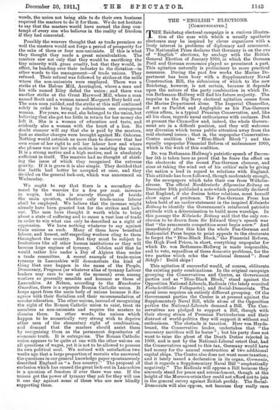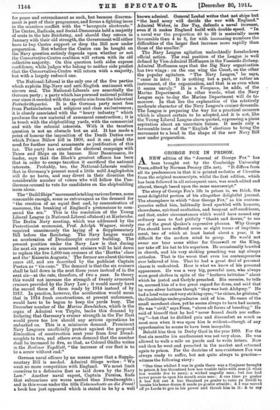THE " ENGLISH " ELECTIONS. [Comanircemen.] T HE Reichstag electoral campaign
is a curious illustra- tion of the ease with which a usually apathetic electorate may be inspired by clever organizers with a lively interest in problems of diplomacy and armament. The Nationalist Press declares that Germany is on the eve of "English" elections, by analogy with the British General Election of January 1910, in which the German Peril and German economics played so prominent a part. This agitation naturally is preliminary to more practical measures. During the past few weeks the Marine De- partment has been busy with a Supplementary Naval Construction Bill, the submission of which to the new Reichstag, however, is not certain, because it depends upon the nature of the party combination in which Dr. von Bethmann-Hollweg will find his future majority. The impulse to the Big Navy electoral agitation comes from the Marine Department alone. The. Imperial Chancellor, if not as Pacifist and Anglophile as his Pan-German critics affirm, is a typical Prussian Conservative, and, like all his class, regards naval enthusiasms with coolness. But at present the Chancellor and, indeed, the whole Govern- ment are in a difficult position, and they will welcome any diversion which turns public attention away from the real electoral issues ; that is, the unpopular Conservative- Centre coalition (the " Blue-Black Block ") and the equally unpopular Financial Reform of midsummer 1909, which is the work of this coalition.
Dr. von Bethmann-Hollweg's patriotic speech of Decem- ber 5th is taken here as proof that he fears the effect on the electorate of the recent Pan-German clamour, and aims at taking the wind out of his critics' sails by giving the nation a lead in regard to relations with England. This attitude has been followed, though moderately enough, by the newspapers which take their cue from Wilhelm- strasse. The official Norddeutsche Allgemeine Zeitung on December 10th published a note which practically declared that England, if she desires better relations, must herself show signs of penitence. The Pan-German Press has taken hold of an earlier statement in the inspired Kolnische Zeitung to identify the Government's reinforced patriotic attitude with a determination to build more warships. In this passage the Kalnisoke Zeitung said that the only con- clusion to be drawn from Sir Edward Grey's speech was that "the armaments competition must begin anew." And immediately after this hint the whole Pan-German and Nationalist Press began to print appeals to the electorate to forget the " Blue-Black Block," the Financial Reform, the High Food Prices, in short, everything unpopular for which Dr. von Bethmann-Hollweg is made responsible, and to vote, regardless of these domestic problems, for the two parties which echo the " national demand " : Baut Schiffe I Build ships !
This agitation if successful would, of course, obliterate the existing party combinations. In the original campaign grouping the Conservatives and Centre, as Government parties and as " Blue-Black Block," stand against the Opposition National-Liberals, Radicals (the lately reunited Fortschrittliche Volkspartei), and Social-Democrats. The naval issue requires an entirely different grouping. Of the Government parties the Centre is at present against the Supplementary Naval Bill, while alone of the Opposition parties the National-Liberals demand a Bill. The Con- servatives are pledged to support a Bill, though with their strong strain of Prussian Particularism and their distrust of world-politics they will support it without real enthusiasm. The obstacle is taxation. Herr von Heyde- brand, the Conservative leader, undertakes that " the necessary sacrifices will be borne " ; but his party does not want to raise the ghost of the Death Duties rejected in 1909, and is met by the National-Liberal retort that, had the Conservatives agreed to this tax, Germany would have had money for the annual construction of two additional capital ships. The Centre also does not want more taxation; and it lately issued a declaration in its organ, Germania, that it regards a Supplementary Naval Bill " emphatically negatively." The Radicals will oppose a Bill because they sincerely stand for peace and retrenchment, though at the height of the Morocco crisis they could not afford not to join in the general outcry against British perfidy. The Social- Democrats will also oppose, not because they really care for peace and retrenchment as such, but because disarma- ment is part of their programme, and forms a fighting issue in the ceaseless conflict with the " bourgeois electorate." The Centre, Radicals, and Social-Democrats held a majority of seats in. the late Reichstag, and should they return in January with their old strength, the Government will either have to buy Centre support or drop the Bill now under preparation. But whether the Centre can be bought on the Navy question entirely depends upon whether or not the Conservative-Centre coalition will return with its old collective majority. On this question both sides express confidence, while judges who belong to neither side predict that the Conservative-Centre will return with a majority, but with a. largely reduced one.
The National-Liberal is the only one of the five parties which exploits Big-Navy and anti-English sentiment with sincere zeal. The National-Liberals are essentially the German party; a party which has pursued national politics ever since it seceded with this specific aim from the historical Fortschrittspartei. It is the German party most free from Particularism and religious and class exclusiveness; it is closely associated with the " heavy industry " which produces the raw material of armament construction; it is in touch with the shipbuilding yards, with the commercial and with the colonial interests. With it the taxation question is not an obstacle but an aid. It has made a point of honour the imposition of the Death Duties over which Prince Billow fell in 1909, and it can plead the need for further naval armaments as justification of this tax. The party has entered the electoral campaign with Taxes and Ships on its banner. Herr Bassermann, its leader, says that the Block's greatest offence has been that in order to escape taxation it sacrificed the national interests. Probably, too, the National-Liberals realize that in Germany's present mood a little mild Anglophobia will do no harm, and may divert in their direction the considerable number of voters who will follow the Pan- German counsel to vote for candidates on the shipbuilding issue alone.
The "Build Ships "movementis taking various forms, some reasonable enough, some as extravagant as the demand for " the creation of an equal fleet and, by concentration of resources, the breaking of England's pretensions to com- mand the sea." This is the resolution of the Young Liberal League (a National-Liberal offshoot) at Karlsruhe. The Berlin Navy meeting, which was addressed by the Protectionist economist, Prof. Adolph Wagner, merely required unanimously the laying of a Supplementary Bill before the Reichstag. The Navy League wants an acceleration of Dreadnought cruiser building. The present position under the Navy Law is that during the next six years six armoured cruisers will be laid down to replace the five 5,600-ton cruisers of the Hertha ' class and the Kaiserin Augusta.' The former are about thirteen years old, and are described by the publicist Captain Pustau as " tin-cans." The demand is that the six cruisers shall be laid down in the next three years instead of in the next six—at the rate, therefore, of two a year. In theory this would not increase the strength of twenty armoured cruisers provided by the Navy Law ; it would merely have the second three of them ready by 1914 instead of by 1917. In practice, however, the acceleration would mean that in 1914 fresh constructions, at present unforeseen, would have to be begun to keep the yards busy. The December number of the Marine Rundschau, which is the organ of Admiral von Tirpitz, backs this demand by declaring that Germany's cruiser strength in the Far East would prove too low should any serious operations be embarked on. This is a minimum demand. Prominent Navy Leaguers unofficially protest against the proposed diminution of construction next year from four Dread- noughts to two, and others even demand that the number shall be increased to five, so that, as Colonel Gitdke writes in the Berliner Tageblatt, " the increase of our fleet is to be a screw without end."
German naval officers by no means agree that a Supple- mentary Bill is needed. Admiral Stiege writes : " We want no more competition with England. We must limit ourselves to a defensive fleet as laid down by the Navy Law." Another naval expert, Captain Persius, finds that submarines are worse needed than Dreadnoughts ; and in this sense under the title Unterseeboote an die Front! a book has just appeared which is stated to be by a well known admiral. General Loebel writes that not ships but "the land army will decide the war with England." Admiral Weber, in Per Tag, defends a naval increase, even if it makes England build with double speed. " In a naval war the proportion 40 to 80 is materially more favourable than 4 to 8, for with increasing numbers the difficulties of the larger fleet increase more rapidly than those of the smaller."
The Navy League agitation undoubtedly foreshadows official action. The real position of the League is well defined by Vice-Admiral Hoffmann in the Vossioehe Zeitung. Admiral Hoffmann says that the Big Navy organization has two wings : on the one wing the Court, on the other the popular agitators. " The Navy League," he says, " came in later. It is nothing but a part, or rather an instrument, of the organization, and that is so even when it seems unruly." It is a Vorepann, he adds, of the Marine Department. In other words, what the Navy League says to-day the Marine Department will do to- morrow. In that lies the explanation. of the relatively moderate character of the Navy League's cruiser demands. The League is preparing the way for a practical measure which is almost certain to be adopted, and it is not, like the Young Liberal League above quoted, expressing a pious aspiration about an uncertain future. It needs only a favourable issue of the " English " elections to bring the movement to a head in the shape of the new Navy Bill now under preparation.







































 Previous page
Previous page